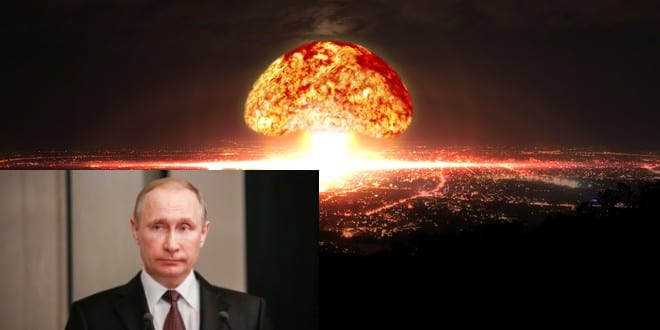On Tuesday, President Vladimir Putin signed into effect a new Russian military doctrine, allowing him to order a nuclear weapons strike in response to an attack using conventional weapons. The new rules also allow the Russian military to use its nuclear weapons if it gets “reliable information” about the launch of ballistic missiles targeting its territory or its allies.
As per the longstanding policy, the president can order a retaliatory nuclear strike in response to an attack using nuclear weapons.
The new policy gives the president the ability to call for a nuclear strike in response to aggression involving conventional weapons that “threatens the very existence of the state.”
In addition, the document now states that Russia could use its nuclear arsenals if it gets “reliable information” about the launch of ballistic missiles targeting its territory or its allies and also in the case of ”enemy impact on critically important government or military facilities of the Russian Federation, the incapacitation of which could result in the failure of retaliatory action of nuclear forces.”
Some of the threats specified in the new policy are conventional forces near Russia’s borders and the deployment of missile defense assets and space-based weapons.
The threat is very real as the Russian military is developing weapons the US may not be able to counter. In 2018, Putin unveiled six new Russian strategic weapons including the Avangard hypersonic glide vehicle (HGV) capable of carrying a nuclear payload. In tests, the Avangard reached speeds of 7,000 mph. When approaching a target, the glider is capable of sharp high speed horizontal and vertical evasive maneuvers in flight, which Russian officials claim makes it “invulnerable to any missile defence system”.
The new policy replaces an older document that was signed 10 years ago and expired earlier this year and seems to be a reversal of policy. At a policy forum two years ago, Putin rejected retaliatory or preventative strikes. At the 2018 forum, he noted that Russia would only launch a nuclear strike if its early warning systems spot missiles heading toward its territory, adding that “the aggressor should know that retaliation is inevitable.”
“When we see a coming strike on the territory of Russia, we will retaliate.” He acknowledged it would certainly result in global catastrophe, but emphasized that “we can’t be those who initiated it.”
“We would be victims of aggression and would get to Heavens as martyrs,” while those who would launch the strike would “just die and not even have time to repent.”
This new policy replaces the Mutual Assured Destruction (MAD) doctrine that dominated both the Soviet and US militaries throughout the 50 years of the Cold War in which a full-scale use of nuclear weapons by two or more opposing sides would cause the complete annihilation of both the attacker and the defender. Based on the theory of deterrence, MAD maintains that the threat of using strong weapons against the enemy prevents the enemy’s use of those same weapons. Proponents of MAD as part of the US and USSR strategic doctrine believed that nuclear war could best be prevented if neither side could expect to survive a full-scale nuclear exchange as a functioning state. Since the credibility of the threat is critical to such assurance, each side had to invest substantial capital in their nuclear arsenals even if they were not intended for use. In addition, neither side could be expected or allowed to adequately defend itself against the other’s nuclear missiles.




